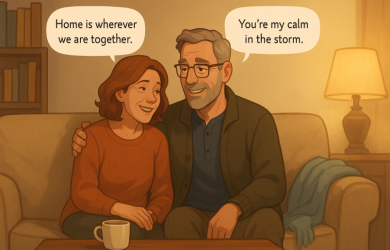5 Characteristics of Happy Couples

Heal & Grow Daily for a Happier Relationship
Subscribe FREEKey Takeaways
Marriage.com AI Quick Summary
“Happy families are all alike; every unhappy family is unhappy in its own way.” So begins Leo Tolstoy’s classic novel, Anna Karenina. Tolstoy didn’t elaborate on how happy families are alike, so I’ve decided to do so for him, based on my research as a psychoanalyst.
Here then are my five characteristics happy couples share. Obviously, in order to have these characteristics, both members of the couple must be emotionally healthy.
1. Good communication
Happy couples talk. They verbalize their feelings instead of acting them out. They do not lie, withhold, cheat, accuse, beat each other, dismiss each other, talk about each other behind their backs, condescend to each other, give each other the silent treatment, guilt trip, forget their anniversary, yell at each other, call each other names, demonize each other, or do the various other types of acting out that unhappy couples do.
Instead, if they have a problem they talk it out. They have a basic trust and commitment that allows them to make themselves vulnerable by sharing their hurts and knowing those hurts will be received empathically. The communications of unhappy couples are meant to manipulate. The communications of happy couples have the goal of resolving conflict and reestablishing closeness and intimacy. Happy couples are not concerned about who’s right or wrong, as they regard themselves as one organism, and what is important to them is that their relationship is right.
2. Commitment
Happy couples are committed to one another. If they are married, they take their marriage vows seriously and they are both equally committed to each other without any ifs, buts, and howevers. Whether they are married or not, they have a strong commitment that never seriously wavers. It is this unshakable commitment that brings stability to the relationship and gives both members the strength to deal with the ups and downs any relationship will go through.
Commitment is the glue that cements a relationship. Whatever difficulty your partner is going through, you are there. There will be no judgments, no incriminations, no threats of leaving or divorce. Such things are out of the question. The commitment is there as a constant, strong foundation that keeps the relationship on course.
3. Acceptance
Happy couple’s accept each other for who they are. Nobody is perfect and most of us are far from perfect. Happy couples accept each other’s imperfections because they are able to accept their own imperfections. This is a key: in order to accept others the way they are you have to be able to accept yourself the way you are. Hence if your partner tends to worry, snore, quibble, stutter, talk too much, talk too little, or want sex too much, you accept such things as idiosyncrasies, not faults.
Unhappy couples think they accept themselves the way they are, but often they are in denial. They can see the speck in their partner’s eye, but not the beam in their own. Because they deny their own faults, they sometimes project them onto their partners. “I’m not the one causing problems, you are!” The more they deny their own faults, the more intolerant they are of the faults of their partners. Happy couples are aware of their faults and are forgiving of them; hence they are forgiving and accepting of the faults of their partners. This leads to mutually respectful relationships.
4. Passion
Happy couples are passionate about each other. Their relationship is the most important thing in their lives. Sexual passion is something that may come and go, but passion for each other and for their relationship is constant. Many couples start out with passion during their honeymoon phase, but this kind of passion declines somewhere along the way. Love and passion for each other, like passion for a hobby, is something that endures beyond the honeymoon period.
Passion is what gives a relationship its vitality. Commitment without passion leads to an empty relationship. Commitment with passion makes for a fulfilled relationship. Passion is fueled by good communication. When a couple shares honestly and resolves conflicts, closeness and passion remain constant. Passion keeps a relationship meaningful and alive.
5. Love
It goes without saying that a happy couple is a loving couple. This is not to say that the couple is in love with each other. Falling in love is often more of an unhealthy than a healthy thing. Shakespeare called falling in love a form of lunacy. It is an idealization, based on narcissistic needs, that can’t last. Healthy love is something that happens in conjunction with the characteristics listed above: good communication, commitment, acceptance and passion.
Our first experience of love is in our relationship with our mother. The trust and the safety she makes us feel is love. Love is not conveyed through words, but through action. In the same way, when we experience trust and safety with our partner in life over a long period of time, we experience enduring love. Enduring love is the love that makes life worth living.
Want a healthier, happier relationship - one step at a time?
 Tips
Tips
Write your tip or submit a video tip
All tips are reviewed before the publishing.
Share this article on
Related Articles
Recent Articles
Related Quizzes
Heal & Grow Daily for a Happier, Healthier Relationship
Subscribe FREE on YouTube We'd love your feedback!
We'd love your feedback!
 Expert Q&A
Expert Q&A
Ask your question related to this topic & get the support you deserve from experts.


















 Thanks for your feedback!
Thanks for your feedback!